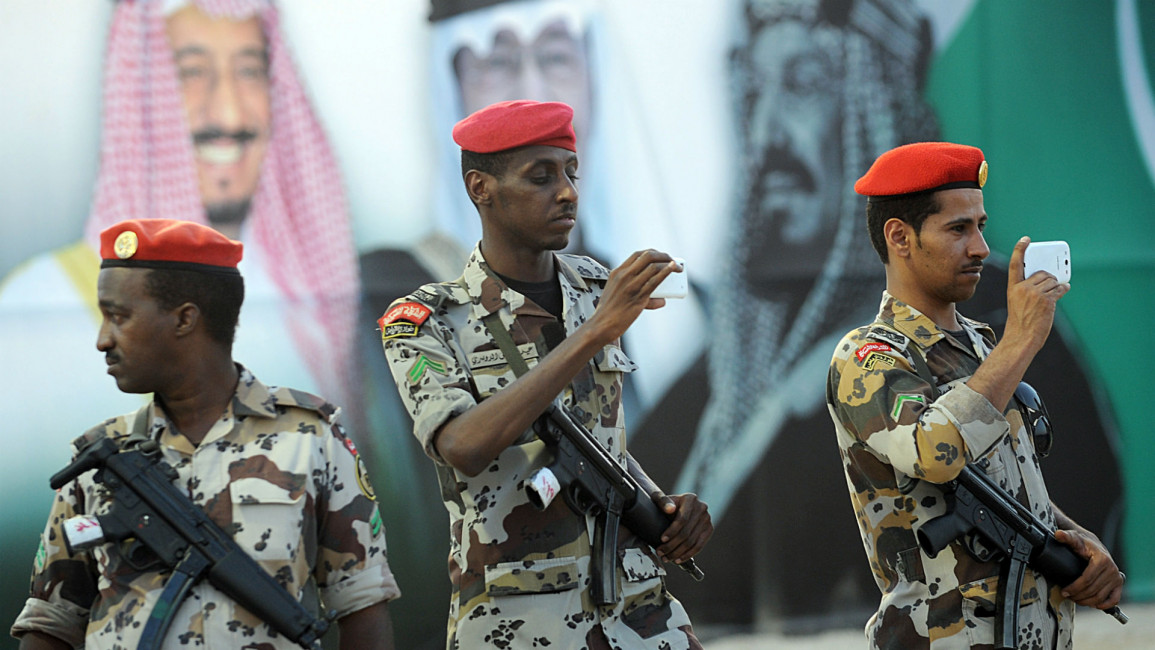
What is behind Saudi's anti-IS ground force plan?
If statements coming from the Gulf are to be taken at face value, then Saudi and Emirati troops are gearing up for a second deployment abroad.
Gulf forces are already engaged in one foreign deployment, fighting Houthi rebels and their allies in Yemen.
This is widely viewed as an attempt to curb Iran's influence in the Arabian Peninsula, and with Yemen considered to be Saudi's "backyard" the war is treated as both domestic and external.
The other threat emanates from the north, where the Islamic State group have carved up territories in northern Syria and Iraq from where its leader Abu Bakr al-Baghdadi makes sparodic threats against the Gulf's ruling clans.
All geared up?
Both Saudi Arabia and Emirati officials have suggested they might commit ground troops for any offensive against IS militants.
But - and there is often a but in such circumstances - the US must take a leading role in a land offensive against the extremist group.
That makes the offer redundant considering Barack Obama's looks to leave office with a contained IS and Washington taking only limited participation in intra-Middle East issues.
This can be seen in the war against IS, where coalition air raids against the group have failed to make real impact on the ground, except perhaps with Kobane.
"Saudi is dealing with IS as a local threat and Iran as local and international one," said Badr al-Rashed, The New Arab's Saudi correspondent.
"[Riyadh] is already against IS but they want to show the world they willing to fight them, too."
Saudi's response to the IS threat has been considerably muted. Bomb blasts by the extremist group - including one on Monday - have brought the threat home to Saudi Arabia and could impact on stability the of the kingdom if they are escalated.
After joining the US-led international coalition against IS - limited to air strikes - the Gulf states have seriously scaled back their contributions to this force after GCC intervention in Yemen.
Although the war in Yemen is frauctious, Saudi has decades of experience in the country and Riyadh likely believes it is able to protect its interests and contain threats through a combination of military intervention and local diplomancy.
In Syria, the pandemonium means that intervention would likely backfire and the risk does not just come from IS.
The involvement of military superpowers in the fray could escalate the situation if the wrong targets are hit, and a desperate, ruthless regime determined to survive is capable of anything.
 |
Saudi might want some kind of 'quid pro quo' in which a greater commitment is made against IS while the US agrees to stepped up support for the rebels. |  |
Rashed believes there is little chance of Saudi and other Gulf states sending ground forces to fight IS although the idea has been touted even before the militarist King Salman took to the throne last year.
"Will Saudis go to war in Syria alone or just with other Arab troops and without US backing? No, they will not fight Russia and the US do not want war with Russia.
Lukewarm intervention
Riyadh and other countries also reportedly scaled back their support for Syrian rebel groups since November. But the failure of the peace process and regime victories in Aleppo could change this.
If reports are to be believed, the rebels are close to collapse or being completely surrounded in parts of Aleppo province. Many international backers of the opposition believe that only tough, urgent action can reverse the situation.
"It is possible the Saudis at least want some kind of 'quid pro quo' in which a greater commitment is made against IS while the US agrees to stepped up support for the rebels in the face of the regime-Russian assaults," said Aymenn al-Tamimi, a Syria researcher said.
"On the other hand, given the impracticalities of launching a ground intervention against IS, why not say so explicitly?"
Nato will meet in Brussles on Wednesday, and the issue of what to do next in the war against IS will likely dominate, along with Russian bellicose actions in Syria and Ukraine.
So far, Nato air raids against IS have been relatively light. This is in part an effort to limit civilian casualties and also reflecting a more general lethergy among anti-IS coalition members.
Saudi's Islamic military coalition also appears unlikely to offer the force needed to confront IS on the ground.
This is despite pleas from some US politicians - such as John McCain - for Muslim countries to take a leading role in the regional fight against extremism, particularly with Washington taking a backseat role in regional turmoil.
"Syria policy as a whole is dictated by Obama's position in his final months in office: the civil war has gotten ever worse and so there is a desire to save face through playing up diplomatic engagement in Geneva," said Tamimi.
"This is even as it was clear no progress would be made as the regime has launched bolder offensives backed by Iran and Russia. Thus, the US administration's denialism that the latest round of engagement has failed."
For the tens thousands refugees massed on the Turkish border - and the many more heading north from Aleppo - many will know that these peace talks are dead in the water.
After five years of being sitting ducks, they will have few expectations that the world will take action to protect them.


![President Pezeshkian has denounced Israel's attacks on Lebanon [Getty]](/sites/default/files/styles/image_684x385/public/2173482924.jpeg?h=a5f2f23a&itok=q3evVtko)



 Follow the Middle East's top stories in English at The New Arab on Google News
Follow the Middle East's top stories in English at The New Arab on Google News


